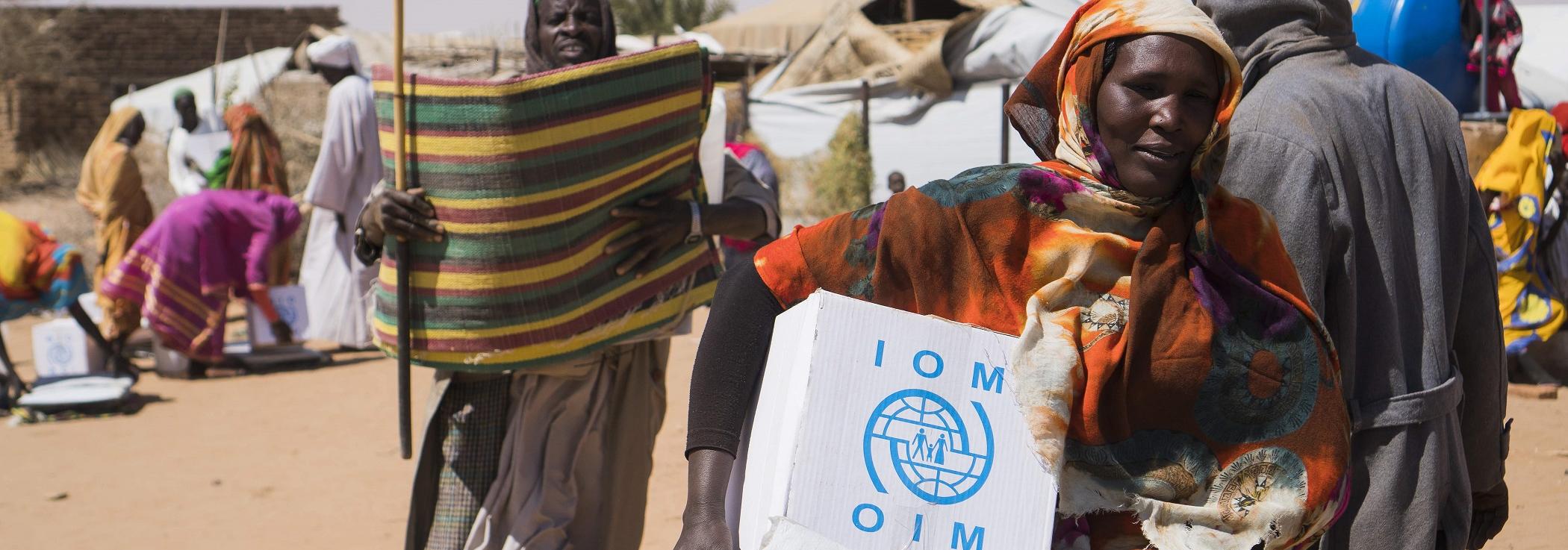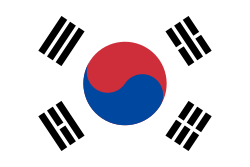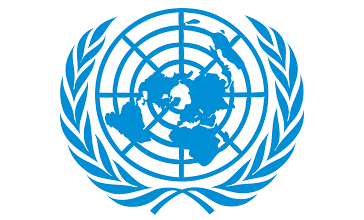IOM Vision
Vision: To adopt an integrated approach to Sudan’s migration challenges in order to support the Government of Sudan (GoS) in both demonstrating the principles and achieving the objectives of good migration governance.
Strategic Framework: Supporting the GoS in building its policies and technical capacity to effectively and humanely address the mobility dimensions of crises in the country, while fulfilling its responsibilities to assist and protect vulnerable mobile populations in accordance with humanitarian principles. In addition, supporting efforts to end displacement and encourage durable solutions by providing communities with key tools to accelerate recovery, transition and socio-economic development and establish an orderly, safe and responsible migration management system able to assist all migrants and benefit Sudan’s development.
Strategic areas of intervention:
- Providing timely identification and assessment of vulnerable displaced and affected populations;
- Delivering emergency assistance and essential services to meet critical needs;
- Building national and local capacity to effectively address the mobility dimensions of crises;
- Facilitating internally displaced persons' (IDPs) return, relocation, local integration, and reintegration;
- Increasing community stabilisation and strengthening resilience;
- Strengthening social cohesion through community-based and institutional capacity building.
Objective
Saving lives and protecting people on the move
IOM foresees humanitarian support will be needed for vulnerable IDPs, refugees and returnees as well as home and host communities where services are stretched, and capacity building support for key governmental and non-governmental stakeholders.
Direct beneficiaries: 87 government counterparts/UN agencies/INGOs/NGOs for more credible, comprehensive and evidence-based situational analysis.
Indirect beneficiaries: 350,000 IDPs, returnees and other affected populations that will receive services based on the information provided.
IOM Sudan has used the Displacement Tracking Matrix (DTM) system since 2004 to regularly capture, process and provide humanitarian actors with multi-layered information products on the locations, composition, vulnerabilities and needs of displaced and mobile populations in order to deliver more targeted humanitarian assistance and response. The following methodologies will be used in Sudan in 2020 to provide this critical information management service:
- Mobility Tracking (MT) (a new methodology in Sudan as of 2019): Implement a periodic baseline assessment and quarterly rounds of data collection on the different target groups within defined locations and update figures at regular intervals.
- Emergency Event Tracking (EET): Deploy within 24-48 hours after an event (such as floods) to track sudden displacements and population movements, monitor ongoing emergencies, or known high-risk locations where population movements occur, capturing best estimates of people in need of rapid response measures.
- Multi-Sectoral Location Assessments (MSLA): Provide accurate and up to date information on the availability of services at major sites of displacement, improving the implementation of humanitarian and transition activities at selected sites.
- Registration: Provide rapid emergency and biometric registrations and data verification upon request of partners and in response to IOM’s internal programmatic needs.
Beneficiaries: 115,000 IDPs, returnees, refugees and other vulnerable crisis-affected local communities.
Shelter and non-food items (NFI) interventions will be used to improve living conditions for vulnerable populations, targeting camps and communities with high rates of displacement or contributing to the safe return or relocation of vulnerable groups. IOM will:
- Conduct shelter surveys and needs assessments to identify and prioritise the most vulnerable households and individuals including people with specific needs (PSN) including women, children and the elderly.
- Purchase, preposition, and provide: (i) non-food items kits; (ii) environmental-friendly materials for locally acceptable improved emergency shelters; and (iii) locally sourced and environmentally friendly materials for the construction of transitional/permanent shelters, which are culturally acceptable and appropriate for the climate.
- Provide training on construction and maintenance techniques targeting beneficiaries and local partners, ensuring that constructed structures meet quality and safety standards.
Beneficiaries: 195,000 IDPs, refugees and other vulnerable crisis-affected communities.
Providing life-saving assistance to people newly displaced by conflict or natural disasters in an effort to recreate pre-emergency conditions using early recovery approaches to improve the overall access to water, sanitation, and hygiene (WASH) services, IOM will:
- Construct/rehabilitate hand pumps and water yards and provide sustainable and environmentally friendly power sources such as solar technology to operate the water points;
- Chlorinate water points to improve access to safe water sources and increase the quantity to the SPHERE standards of 7.5 -15 litres per person per day (l/p/d);
- Preposition spare parts, tools, and water purification kits (water filters for households) for the necessary maintenance and rehabilitation of WASH facilities;
- Construct more gender, age and disability sensitive latrines, and rehabilitate and maintain sanitation facilities to prevent groundwater contamination, reduce open defecation and improve hygienic practices;
- Launch hygiene campaigns to raise awareness of safe hygiene practices and support communities to develop waste management protocols such as garbage collection to improve the environment;
- Provide hygiene kits (including menstrual hygiene management items);
- Train both female and male community members as technicians to operate and maintain water points and provide chlorination for water sources. Establish waste and water management committees to collect tariffs from community members to maintain facilities and develop contingency plans including Operation and Maintenance guidelines.
Beneficiaries: 167,580 IDPs, returnees and other vulnerable crisis-affected communities.
To reduce mortality, morbidity and alleviate the suffering of crisis-affected individuals and host populations, by ensuring access to and availability of life-saving health care, IOM will:
- Support the Ministry of Health (MoH) by rehabilitating and running health care facilities and mobile clinics to provide inpatient and outpatient care and facilitate referrals for specialised medical assistance to secondary and tertiary facilities for continuity of care.
- Provide operational costs for the target health facilities to deliver the minimum basic package of primary health care services encompassing: (i) general clinical and trauma care; (ii) management of communicable diseases such as malaria; (iii) management of non-communicable diseases such as diabetes, high blood pressure and mental health; (iv) management of sexually transmitted infections (STIs) and HIV/AIDS sexual and reproductive health, including maternal and newborn health; (v) management of child health including prevention, screening, diagnosis and management of malnutrition and immunisation; (vi) establishing early warning and response systems to support disease surveillance; and (vii) providing waste management and vector control services to improve environmental health.
- Providing capacity building trainings and refresher courses for health care providers and community health workers to facilitate community-led initiatives for health promotion including training on the topics of common public health risks, infection prevention and control, reproductive health, good infant and young child feeding practices, community management of acute malnutrition and other positive health practices.
Beneficiaries: Direct beneficiaries - 20 INGOs/NNGOs.
Indirect beneficiaries: 400,000 IDPs and other affected populations that will receive services based on support provided.
IOM plans to carry out the following:
- Enable partners to provide life-saving humanitarian assistance to people affected by natural and/or human-made disasters in Sudan in an effective and timely manner through the management of a flexible, efficient and need-based funds disbursement mechanism for humanitarian actors operating in multiple sectors of emergency response. This includes non-food items (NFI), water sanitation and hygiene (WASH) services, shelter, protection, health and humanitarian coordination assistance. This will be done via a flexible, effective and timely disbursement of grants to international and national non-governmental organizations (NGO) partners. IOM will build the capacity of NGO partners to address the topics of protection, from sexual exploitation and abuse (PSEA) and accountability to affected populations (AAP) to ensure that support is in line with humanitarian principles and funds are used effectively.
- Fill identified gaps in the emergency logistics and transportation capacity of humanitarian partners in close coordination with the Logistics and Emergency Transportation (LET) sector lead, WFP, OCHA and other UN agencies at the field level by providing logistics services and transporting relief items to support the humanitarian community's response to emergency needs of vulnerable populations affected by natural disasters and/or by conflict, particularly those living in rural areas with limited access to services. LET support will include: (i) selecting the best and most cost-effective means of transportation (air or land) and associated transportation clearances; (ii) process escorts request depending on the security situation of final destination (UNAMID, police or both); (iii) deliver relief items so that affected people receive timely life-saving humanitarian assistance and protection; (iv) administer a logistics database to track transported items and track fleet management and report on the delivery of relief items compared to a detailed inventory of transported items; and (v) support capacity building of government counterparts on logistics-related training.
Objective
Driving solutions to displacement
IOM foresees that recovery and transition support will be needed for IDPs, IDP and refugee returnees and other internal migrants and displacement-affected communities facing challenging conditions, such as residual insecurity, damage to property and public infrastructure, limited access to services and livelihood opportunities, and fractured social relations; as well as vulnerable pastoralists and sedentary communities along migration routes; and capacity building support for key related Governmental and non-Governmental stakeholders.
Beneficiaries: 100,000 conflict/disaster-affected people including IDPs, returnees, and underserved home and host communities.
IOM will conduct the following activities to provide sustainable access to water and sanitation infrastructure and management mechanisms that enable beneficiary communities in the Darfur and Kordofan States and East Sudan to respond to future shocks, decrease competition over resources and increase community resilience to public health risks. Exit strategies will be developed to alleviate aid dependency in protracted emergencies by strengthening self-reliance and facilitating community solutions in a more holistic approach, including:
- Drilling, construction and/or rehabilitation of water points and provision of water purification kits and chlorination tablets as well as prepositioning of spare parts and tools to sustain or increase access to safe and clean water. Improving access to safe water will ensure that the targeted communities will have better livelihood opportunities by providing them with water for agriculture and livestock – which are primary sources of income in many of the communities.
- Use community-led approaches to total sanitation (CLTS) to engage the community in designing responses and supporting the construction of more gender, age and disability sensitive latrines, and rehabilitation and maintenance of the sanitation facilities to prevent groundwater contamination, reduce open defecation and improve hygienic practices.
- Provide hygiene promotion campaigns to positively encourage a change in attitude and behaviour towards safe hygiene practices.
- Improve and sustain access to water and sanitation services and hygiene message to increase community resilience to disease outbreaks and malnutrition by addressing the risks related to faecal-oral transmission and water contamination.
- Community members will be trained to establish waste and water management committees, consisting of both men and women, to collect tariffs from community members to support the maintenance of facilitates and develop contingency and sustainability plans.
Beneficiaries: 100,000 IDPs, returnees and home and host communities with a special focus on underrepresented groups such as women and youth.
Community stabilisation programming aims to prevent, mitigate and reduce the drivers and negative effects of forced displacement and irregular migration related to natural and/or human-made crises. This includes access to the provision of essential services, the promotion of social cohesion and community management of natural resources, capacity building and supporting inclusive economic recovery through livelihood opportunities. In order to (re)establish stability and security, prevent further forced migration, restore trust among community members, vulnerable populations and local authorities and lay the foundations for peace and durable solutions, IOM will:
- Engage civil society organizations (CSOs) and community-based organizations (CBOs), government institutions or other community associations on outreach strategies in partnership with the private sector and on formal and informal community programmes to promote participation and introduce participatory decision-making at the community level;
- Build the capacity of local leadership and organizations to support social cohesion and conflict resolution sessions within the communities to promote peaceful coexistence in fragile contexts and amongst vulnerable local/host communities;
- Provide basic services and infrastructure to promote social cohesion such as community-owned buildings (schools, community learning centres, recreational facilities) as well as community-based programs (farming and small business cooperatives);
- Build community capacity for sustainable management of natural resources and basic services and support collective action and community-led interventions to promote social cohesion and local integration;
- Support skills development and income-generating opportunities in agriculture, livestock, trade and animal health for vulnerable members of the community in an inclusive way (such as providing opportunities to community members from different tribes and including women and other underrepresented groups in decision making and job opportunities).
Beneficiaries: 170,061 IDPs, returnees, refugees and home and host community members.
Progression towards durable solutions will be supported by using the Progressive Resolution of Displacement Situations Framework (PRDS) to gradually resolve protracted displacement in complex crisis situations. IOM Sudan aims to strengthen the capacity of individuals, households and communities to better prevent, absorb and recover positively and effectively to future risks by contributing towards rapid recovery and self-reliance and promoting local integration and (re)integration in safer and more secure living conditions with better access to resources and opportunities by:
- Supporting community-led workshops and initiatives including water, waste, resource management and security committees who will be responsible for developing community action plans for future initiatives and contribute to the selection of the activities to be implemented in areas of intervention;
- Constructing/rehabilitating basic infrastructure and facilities that increase access to an adequate standard of living, access to adequate water, health services and education;
- Build capacity for local institutions and communities to support the provision, maintenance and sustainability of basic services, safety and security, such as training water technicians, health workers and teachers in coordination with the relevant ministries;
- Providing sustainable livelihoods and employment by distributing income-generating assets and facilitating market-oriented vocational and livelihood training based on community-identified priorities, available value chains and in coordination with participating local institutions.
Beneficiaries: 50,000 people from pastoralist or sedentary communities along migratory routes.
IOM will promote community stabilisation and manage tensions between pastoralist and sedentary communities along migration corridors in Sudan - specifically linked to the effects of climate change on agriculture and seasonal livestock migration patterns - by improving conflict resolution and generating peace dividends. IOM will:
- Foster dialogue facilitating regulated access to pastures and resolve land issues by enhancing traditional conflict resolution mechanisms and capacity building for local rural courts/institutions;
- Facilitate climate change adaptation strategies and policies through capacity building of communities and authorities on climate-smart agriculture;
- Provide training on drought-resistant agricultural techniques and livestock management;
- Increase water access and provide basic infrastructure targeting communities along migration corridors as part of conflict mitigation measures or peace dividends;
- Develop integrated water resource management systems to promote the coordinated development and management of water, land and related resources, in order to maximise socio-economic gains without compromising the sustainability of vital ecosystems.
Objective
Strengthen preparedness and reduce disaster risk
IOM foresees emergency preparedness measures and support to reduce disaster risks for IDPs, IDP and refugee returnees, vulnerable internal migrants and local communities prone to risks associated with man-made or natural hazards, as well as capacity-building support for related Governmental and non-Governmental stakeholders.
Beneficiaries: 100,000 IDPs, returnees, and vulnerable communities prone to risks associated with man-made or natural disasters.
Disaster Risk Reduction (DRR) mechanisms will be developed and used to mitigate the impact of disasters and build resilience to shocks and stresses through capacity building, establishing DRR committees and the provisions of preventative infrastructures. IOM will:
- Train beneficiaries on DRR to support community early recovery response and raise awareness on mitigation measures;
- Establish community DRR committees within existing structures (camps, settlements, and communities) in order to provide awareness-raising campaigns and promote longer-term resilience to disaster-related shocks by developing contingency plans;
- Build rapid response capacity of relevant government institutions and other key stakeholders to develop DRR plans including supporting the use of early warning systems and planned relocations;
- Build/rehabilitate basic infrastructures such as proper drainage systems and culverts for flood prevention and to facilitate access to basic services (such as hospitals, markets and schools).
Sudan
The map used here is for illustration purposes only. Names and boundaries do not imply official endorsement or acceptance by IOM.
Figures are as of 31 December 2023. For more details of IOM's operational capacity in country, please see the IOM Capacity section.
















